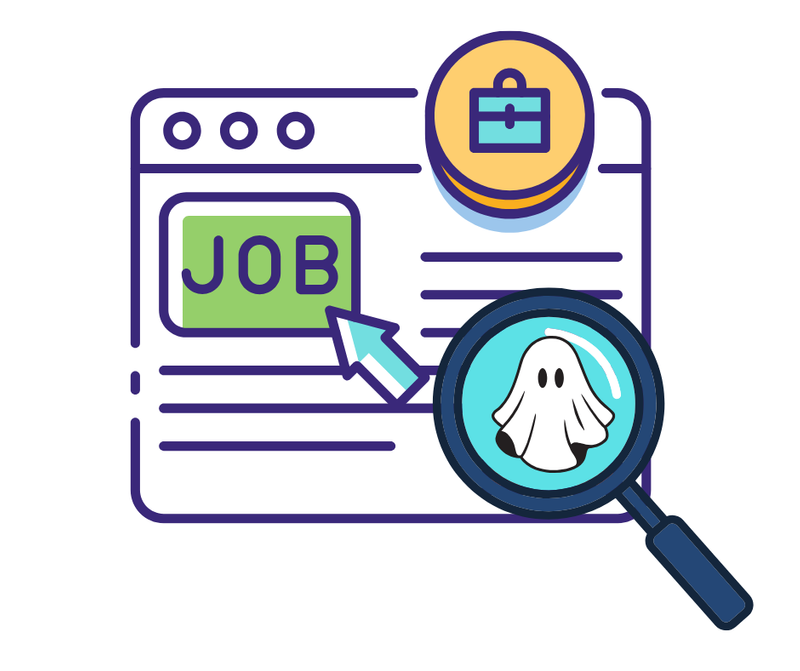 A "phantom hiring trend" is haunting the job search market.
A "phantom hiring trend" is haunting the job search market.
You're scrolling through LinkedIn and see what looks like a promising role. As you open the listing, you notice that this job was reposted recently, but has been active for over a month now.
Upon further investigation of the company's website, the job listing is nowhere to be found. Almost as if it never existed, just like a ghost.
Welcome to the spooky reality of the modern job search and the increasing trend of "ghost jobs".
What Is a "Ghost Job"?

A "ghost job", also known as a phantom job, is a job listing posted online by a company that has no intention of filling that position.
Such spooky deception can be rather frustrating in modern-day job searching. However, knowing why companies do this and what to look for in identifying a ghost job can help you navigate these ghostly menaces.
Why Do Companies Post Ghost Jobs?

Across various studies, hiring managers provided a variety of reasons for uploading these ghost jobs.
Some of the reasons included:
Increasing talent pools
Giving the illusion of company growth
Providing "incentive" to current employees to keep working hard, as they're "replaceable"
Ghost-Proofing Your Job Search

To help your ghost hunting during your job searching, you need to have a checklist on hand to aid in identifying and avoiding ghost jobs.
When creating your own checklist, there are 6 key things to be mindful of.
Check the posting date and history.

Avoid jobs with vague language.

Beware of job duplicates!

Research the employer.

Reach out and verify the job.

Are the job perks realistic?

Ghost Job Checklist: A Closer Look

1. Check the posting date and history.
Timelines are really important to note when looking at posted job listings.
Job posted (1 month ago): There's a good chance the company is processing job applicants. According to current research, companies can take up to 44 days on average to fill an open position.
Job posted (2 or more months ago): It's most likely a ghost job.
Reposting monthly: Jobs reposted monthly despite having 100’s of applicants could suggest a ghost job.
No close date: Having no deadline for applying could suggest a ghost job.

2. Avoid jobs with vague language.
Be mindful of job listings that don't clearly outline job role requirements. Some things to look out for are:
Job titles: No level mentioned (e.g. data expert).
Responsibilities: Not specifying daily tasks. (E.g. "assist staff with various projects").
Requirements: Not stating specific qualifications or skills for the role, using buzzwords instead.
Buzzwords: superstar, rockstar, go-getter, wear many hats, work hard play hard, ninja, guru, self-starter, entrepreneurial spirit, we’re like a family, and, winners mindset.

3. Beware of job duplicates!
Be sure to look across other hiring platforms such as Seek, Indeed, and LinkedIn to see if there are any duplicate copies of jobs. Look out in particular for:
Different dates: Inconsistent dates across different hiring platforms for the same job.
Reposting timeframe: Reposting the same job again multiple of times in a short amount of time.

4. Research the employer.
To help determine if a job is actually real and not a ghost job, do a bit of research on the company that is hiring in the job posting. Look into things such as:
Social media and company websites: see if there is any mention of the job posting advertised on the company's social media or website platforms.
If the job is mentioned on either platform, the job is probably legit.
If there is nothing mentioned, you've most likely found a ghost job.
LinkedIn and Glassdoor: Check on these platforms to see if anyone has reported ghost jobs at the company that posted the job.

5. Reach out and verify the job.
Contact the hiring company about the job posting:
Email or call the contact provided on the job posting or via their website and/or social media to inquire about the job listing.
If you receive a response, the job is probably real.
If there's no response, you've probably found a ghost job.

6. Are the job perks realistic?
Sometimes, ghost jobs will use attractive perks and benefits as a way to lure people into applying. These perks can distract you from the lack of job details. (e.g. free gourmet food, flexible remote work, a dynamic and exciting work environment).

To Catch a Ghost
 Let's put those newly learnt ghost job detecting skills to the test!
Let's put those newly learnt ghost job detecting skills to the test!
Here are two jobs listings for an admin assistant role. One or both may be a ghost job in disguise.
Job 1: Part-Time Admin Assistant
Location: On site
Posted 5 weeks ago
Looking for a superstar entry level admin to join our awesome team at Fun House Warehouse!
Responsibilities:
Picking up the phone and answering calls.
Support various departments
Using great communication skills
Experience with data
Benefits:
Competitive compensation
Job 2: Part-Time Admin Assistant
Location: On site, Ohio
Posted 2 weeks ago
About:
We are a family run dental practice that cares deeply about the dental health of our community. We are looking to expand our team by hiring an experienced admin-assistant.
Responsibilities may include:
Managing communications (phone, email, mail).
Maintaining records and databases.
Managing calendars
Benefits:
Significant staff discounts on dental care products
Dental insurance coverage
Quiz
Which is most likely to be the ghost job?
Take Action

Keep an eye out for ghost jobs on your job hunt:
Your feedback matters to us.
This Byte helped me better understand the topic.
